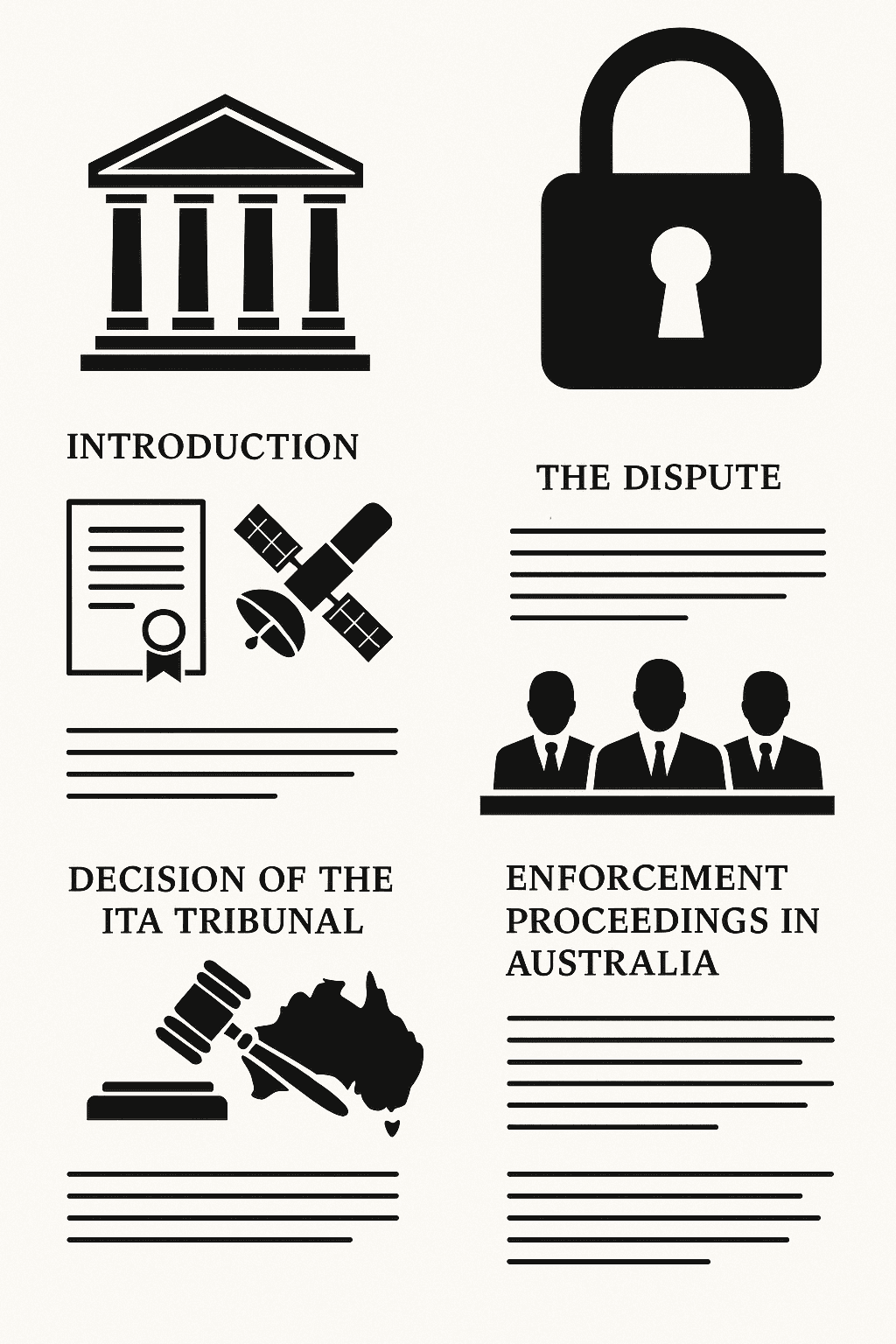



"Justice cannot be for one side alone, but must be for both"
Sovereign Immunity: Whether it has resolved the conundrum of enforcement of Investment Treaty Arbitration (ITA) Awards or made it more complex

Published on : 28/07/2025
View Count : (15)
Sovereign Immunity: Whether it has resolved the conundrum of enforcement of Investment Treaty Arbitration (ITA) Awards or made it more complex
Sovereign Immunity: Whether it has resolved the conundrum of enforcement of Investment Treaty Arbitration (ITA) Awards or made it more complex
Author Details
Mr. Himanshu Varshney
Ph.D. Candidate
Centre for International Legal Studies
School of International Studies
Jawaharlal Nehru University, New Delhi
Click here for copyrights policy
Introduction:
In the wake of various ITA awards enforcement proceedings pending against India in USA, Canada, France, Netherlands and Australia in CC/Devas case v. India (I),[1] the Australian Federal Court on 31 January 2025 refused to enforce the 111.30 million USD (₹ 9,67,68,72,453.36) ITA Award against India in the Australian jurisdiction and held that India had not waived its sovereign immunity by signing the United Nations Convention on the Recognition and Enforcement of Foreign Arbitral Awards or New York Convention[2] (New York Convention) because it has adopted “commercial” reservation under Article I (3) of New York Convention. Accordingly, the New York Convention will be applicable only to differences arising out of legal relationships which are considered as commercial under the law of India and disputes relating to investment are not considered commercial under the Indian law.[3]
The Australian Federal Court set aside the decision of single judge (underlying decision)[4] which found that, by ratifying the New York Convention, India had waived its sovereign immunity.
The Dispute
The dispute between India and foreign investor (Mauritius-based investors) arose from a cancelled contract between the Indian Devas Multimedia and the Indian State-owned company Antrix for the lease of space segment capacity on two Indian satellites (Devas/Antrix Agreement). Following the cancellation of the Devas/Antrix Agreement, the foreign investors brought international claim against India for the violation of protection given to foreign investors under the Mauritius-India Bilateral Investment Treaty, 1998 (the BIT).
Decision of the ITA Tribunal
An ITA tribunal was constituted pursuant to the BIT which found that India had violated the protection against Indirect Expropriation; protection of Fair and Equitable Treatment (FET); Minimum Standard of Treatment, including denial of justice guaranteed to the foreign investor and rendered an award against India.
The Mauritian investor initiated the ITA award enforcement proceedings in various jurisdictions to realise the sum of the award and to collect the money from Government of India by attaching its property located in other countries. The enforcement proceeding was not initiated in India by the foreign investor as India has no exclusive law which would be applicable on the enforcement of ITA awards. The only law applicable for the purpose of enforcement of awards in India is Arbitration and Conciliation Act, 1996 (the Act) which was enacted by Parliament of India to rectify the New York Convention. As the India has already adopted commercial reservation to the New York Convention while signing it, the Act is exclusively applicable to differences arising out of legal relationships, which are considered as commercial under the law of India.
Enforcement proceedings in Australia:
The relevant proceeding for the enforcement of ITA award is brought by the foreign investor against India for the recognition and enforcement of an arbitral award pursuant to Section 8 of the Australian International Arbitration Act 1974 which provides for the recognition of foreign arbitral awards.
The central question before the Australian Federal Court is that “whether by ratifying the New York Convention, the Republic of India “submitted … by agreement” within the meaning of Section 10 (2) of the Australian Foreign States Immunities Act 1985 (the FSIA) to the jurisdiction of the Federal Court of Australia.
It is common ground that India ratified the New York Convention with effect from 11 October 1960 subject to the reservation allowed under Article I (3) that it would “apply the Convention only to differences arising out of legal relationships, whether contractual or not, which are considered as commercial under the Law of India” while Australia acceded to the New York Convention with effect from 24 June 1975 without any reservation. By availing the commercial reservation to the New York Convention India had not waived its immunities with respect to awards resulting from non-commercial disputes.
The primary judge in his decision of 24 October 2023 answered the above question in the affirmative, finding that India’s agreement to the New York Convention constituted “by way of clear and unmistakable necessary implication” submission by agreement within the meaning of Section 10 (2) of the FSIA[5] in respect of proceedings against it for recognition and enforcement, where the award and “what appears on its face to be an agreement with India to arbitrate the underlying dispute” is tendered.[6]
The appeal was preferred, with leave of the primary judge, against his decision by India before a three-judge bench of the Federal Court of Australia comprising Sarah C. Derrington, Stewart and Feutrill JJ.
Australian Federal Court in appeal noted that foreign states are immune from jurisdiction under the FSIA unless one of the limited exceptions applied. One of those exceptions, in Section 10 (2), contemplates situations when the state waived its immunities “by agreement or otherwise”; and another exception is, in Section 11, which concerns proceedings that relate to a “commercial transaction”.[7]
India did not waive its right to foreign state immunity that it enjoys under Section 9 of the FSIA.[8] Any waiver by India of its immunity in proceedings in the Court for the enforcement of an award under the New York Convention is limited by its reservation. The “differences” that were determined by the arbitral award that is the subject of the proceeding were not “commercial”. Thus, India did not waive its foreign state immunity in the proceeding by ratifying the New York Convention.
The Way Forward:
Enforcement of award is post-arbitration proceedings through which investor seeks the final justice. It is the last bastion which the investor must win as the sovereign immunity is the last hurdle. It represents the culmination of the dispute resolution process. However, the doctrine of sovereign immunity often serves as the final and most formidable barrier, requiring careful legal strategy to overcome and ensure compliance.
Though the award is not enforceable in Australian jurisdiction against India due to sovereign immunity protections or other procedural limitations, it does not preclude the foreign investors to enforce it elsewhere. Foreign investors can still seek recognition and enforcement of the award in other jurisdictions where India holds commercial assets.
References
[1] PCA Case No. 2013-09.
[2] Convention on the Recognition and Enforcement of Foreign Arbitral Awards, June 10, 1958, 330 U.N.T.S. 3.
[3] When signing, ratifying or acceding to this Convention, or notifying extension under article X hereof, any State may on the basis of reciprocity declare that it will apply the Convention to the recognition and enforcement of awards made only in the territory of another Contracting State. It may also declare that it will apply the Convention only to differences arising out of legal relationships, whether contractual or not, which are considered as commercial under the national law of the State making such declaration.
[4] CCDM Holdings, LLC v Republic of India (No 3) [2023] FCA 1266.
[5] A foreign State may submit to the jurisdiction at any time, whether by agreement or otherwise, but a foreign State shall not be taken to have so submitted by reason only that it is a party to an agreement the proper law of which is the law of Australia.
[6] CCDM Holdings, LLC v Republic of India (No 3) [2023] FCA 1266 (J) at [31], [51] and [103].
[7] Commercial transactions
[8] Section 9 provides that except where FSIA specifically provides otherwise, a foreign State cannot be subjected to the jurisdiction of Australian courts in legal proceedings.
Journal Volume
You should always try to find volume and issue number for journal articles.


Nyayavimarsha
No. 74/81, Sunderraja nagar,
Subramaniyapuram, Trichy- 620020